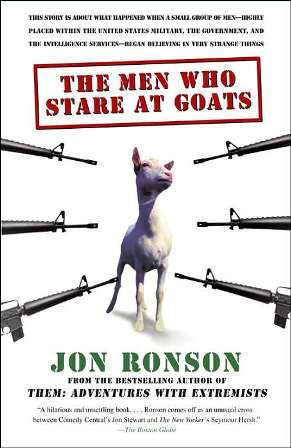In 1967, the CIA conducted Operation Acoustic Kitty, in which it surgically wired up a cat with a microphone and antenna to spy on the Russians. The project is rumored to have cost somewhere in the neighborhood of $20 million. Its first mission was to spy on a Soviet facility in Washington, DC. Shortly after being released, the cat was killed by a taxi and the project was declared a total loss.
This story—firmly in the so-wacky-it-can-only-be-true category—is just the kind of thing that inspires The Men Who Stare at Goats, a movie about the rise and fall of a unit investigating the military possibilities of New Age spirituality and the paranormal within the U.S. Army in the 1970s and 1980s and its effect on the current war in Iraq. In place of the “a true story” tag that opens so many movies, Goats tells you that “more of this is true than you would believe.” This, like the rest of the movie, is fun and funny, but the tension between what’s real and what isn’t is a tightrope that Goats, unfortunately, can’t quite walk without falling off.
The Men Who Stare at Goats follows the adventures of Bob Wilton, a hapless journalist (played by Ewan MacGregor) who goes to Iraq to prove something to himself and ends up in the hands of Lyn Cassady (George Clooney), a former (or is he?) member of the paranormal unit, dubbed the New Earth Army. Cassady has swallowed the New Earth Army’s ideology hook, line, and sinker, with surprisingly sweet results: Just underneath the scrambled brain and fatalism, Cassady is a moony idealist who quickly sees Wilton as his protégé, and begins instructing him in—and here I am quoting the movie directly—the ways of the Jedi. Meanwhile, Cassady’s mission takes both of them on a trip across Iraq, where they encounter defense contractors, American entrepreneurs who declare the tax-free occupied Baghdad to be “Year Zero” for commerce, and finally, an encounter with the current military that forces Cassady and other members of the paranormal unit to come to terms with their pasts.
The Star Wars parallels are strong in Goats: Along with the Jedi stuff, we have a vision of the Empire, as well as the light and dark sides of the force. More fundamentally, the Star Wars allusions give the movie a sense of morality: As he moves from padawan to knight, Cassady increasingly becomes aware of how he, the paranormal unit, and the U.S. Army more generally, could use the powers they’re developing for good, and how tempting it is for all of them to use the powers for evil. Alongside the Star Wars retelling, however, sits a Dr. Strangelove-era farce, and these two understandings of the same story—as Cassady himself says, “there’s different ways of looking at it, different words for a reality”—don’t quite seem to connect.
I really wanted to like this movie, and it certainly has its moments. George Clooney fans (I’m one) will not be disappointed in his funny and soulful performance here, and fellow actors MacGregor, Jeff Bridges, and Kevin Spacey are clearly having a very good time. (Or if they’re not, then they’re even better actors than I thought.) Yet—as Dr. Strangelove did—Goats seeks more than entertainment; it asks you to take it seriously as commentary on the situation in Iraq and the overall mindset of the military in general. The problem is that, to me, as the movie sets them up, the Stars Wars and Dr. Strangelove strands of the plot undermine each other. One asks you to believe that people can really develop superhuman abilities through strict training and personal discipline—that, as the movie cheekily puts it, people can be all that they can be. The other mocks the ability of anything the U.S. Army does to ever come to any good. More broadly, the movie’s Star Wars parallel invites us to become more politically aware and active members of society, working for peace. The Strangelovian parallel would have you believe that that’s all just a bunch of hippie nonsense. At the very, very end, the scales are tipped toward Star Wars at the expense of Strangelove. Which is nice. But it feels like the easy way out. All through the movie, I kept hoping that the tension between the poles wasn’t just an argument, but a dialectic, so that something at the end would supercede the argument, reform the question, push the ideas further. That, alas, never happens.
It’s a little unfair, of course, to judge a movie for something it doesn’t try to do. But I bring it up because I think that, with some revision, they could have pulled it off. You even see glimmers of it in Clooney’s performance: He plays his role as if Cassady knows the answer, as if he knows how to resolve the tension between good and evil, between idealism and cynicism. But if he does, he’s not telling us.
Brian Francis Slattery has trouble writing in a straight line on a piece of paper in a dark theater.










